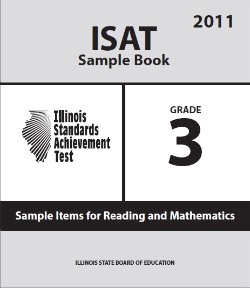State Lowers ISAT Passing Requirements, Not Making The Tests Dumber.
By Chuck Sudo in News on Oct 18, 2010 2:30PM
 21 years ago the editors of the late Spy magazine published a book of satire called The 90's: A Look Back. One of the chapters featured an essay from "Secretary of Education" Howard Hesseman, back then star of the comedy "Head of the Class," who wrote, "The only way to make kids smarter would be to make tests dumber." Read this article from the Tribune on how the Illinois State Board of Education is lowering the passing thresholds for the Illinois Standard Achievement Test (ISAT) and, by extension, ensuring an increase in passing rates, you might view Hessman's satirical essay as prescient.
21 years ago the editors of the late Spy magazine published a book of satire called The 90's: A Look Back. One of the chapters featured an essay from "Secretary of Education" Howard Hesseman, back then star of the comedy "Head of the Class," who wrote, "The only way to make kids smarter would be to make tests dumber." Read this article from the Tribune on how the Illinois State Board of Education is lowering the passing thresholds for the Illinois Standard Achievement Test (ISAT) and, by extension, ensuring an increase in passing rates, you might view Hessman's satirical essay as prescient.
Since 2006, the number of points needed to pass a fifth grade level reading test have decreased from 36 out of 56 points (64 percent) to 31 (55 percent). The passing threshold for third and fourth-grade reading tests has dropped seven points in four years, from 61 percent to 54 percent. State Board of Education officials say the decline in passing thresholds is due to a standard statistical process in testing called "equating," which is used to ensure tests are comparable across years, even when the difficulty of questions varies. They contend that, when test questions are easier, more correct answers can be required to pass. When test questions are harder, fewer correct answers can meet the passing bar.
Critics and testing experts argue, however, that the changes may be due to pressure to produce results. Under the No Child Left Behind Act, state Boards of Education across the nation are under pressure to meet the requirements set under the legislation with greatly reduced resources and funding. In Illinois, the number of students required to pass standard aptitude achievement exams has increased to 77.5 percent. Schools throughout the state face sanctions if those numbers aren't met. Critics of lowering the passing thresholds fear that the state is doing so in order to meet the numbers set by No Child Left Behind.
In Illinois, the passing requirements have dipped the most on reading tests for third- through eighth-graders, the period where students develop their sense of reading comprehension. Math testing results in those grades have also decreased significantly. It makes one wonder if students in Illinois are entering high school with the basic aptitude to excel, and watchdogs wondering if Johnny can read.